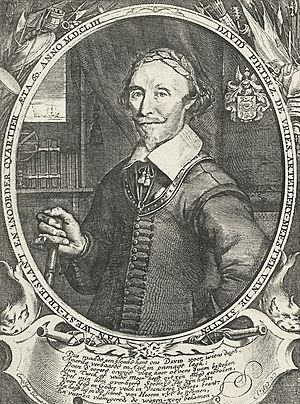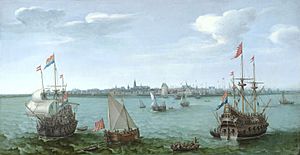David Pietersz. de Vries facts for kids
Quick facts for kids
David Pieterszoon de Vries
|
|
|---|---|

David Pietersz. de Vries, by Cornelis Visscher.
|
|
| Born | 1593 |
| Died | 13 September 1662 (aged 68–69) |
| Nationality | Dutch |
| Occupation | Sailor |
David Pieterszoon de Vries was a Dutch sailor and explorer. He was born around 1593 in Hoorn, a town in the Netherlands. He passed away on September 13, 1655. David de Vries was known for his many voyages across the oceans. He helped set up new settlements in North America.
Contents
David de Vries's Early Voyages
David de Vries began his sailing career early. In 1617, he went on a whaling trip. This journey took him to Jan Mayen, an island far north in the Atlantic Ocean. Whaling was a big business back then.
Sailing to North America and Europe
A few years later, in 1620, De Vries sailed to Newfoundland. This island is now part of Canada. There, he traded for dried fish. He then took the fish to Italy to sell it. In Toulon, France, he joined Charles, Duke of Guise. The Duke was a French nobleman. In 1624, De Vries went to Canada again. He was still working for the French at this time.
After returning to the Netherlands, De Vries faced a problem. The Dutch West India Company stopped his ship. This company had a lot of power over trade. De Vries decided to sell his ship. He then traveled to Bayonne, France.
Journeys to the East and New Colonies
In 1627, De Vries sailed from Hoorn to Batavia. This city was a major Dutch trading post. It is now Jakarta, Indonesia. On this trip, he sailed with Jan Pietersz Coen. Coen was a very important leader of the Dutch East India Company. From Batavia, De Vries sailed to Masulipatnam in India.
In 1629, De Vries helped start a new colony. This colony was in North America. It was called the Swanendael Colony. It was located in Lewes, Delaware. The Dutch West India Company organized this settlement. Several merchants hoped to become leaders, called patroons, of the colony. These included Kiliaen de Rensselaer and De Vries himself.
The Swanendael Tragedy
When De Vries visited the Swanendael Colony in 1632, he found a sad sight. The settlers had been attacked. Their fort was burned down. This was a very difficult moment for the new colony.
Building New Settlements
De Vries returned to North America two more times. He worked to build new places for people to live. In 1639, he started a settlement on Staten Island. This island is now part of New York City. In 1640, he started another settlement. It was north of Pavonia. This new place was known as Vriessendael.
In 1636, De Vries also built a small fort. It was called a blockhouse. This blockhouse was on Signal Hill on Staten Island. It was the first signal house built by Europeans in North America. Later, Fort Tompkins was built on the same spot.
De Vries as a Peacemaker
David de Vries often tried to keep the peace. He worked between the Lenape people and the Dutch leader, Willem Kieft. Kieft was the director-general of New Netherland. De Vries tried hard to stop Kieft from starting conflicts. These conflicts led to what is known as Kieft's War.
After some serious events, De Vries helped bring people together. He helped the Hackensack Indians leader Oratam negotiate a truce. He also helped the Canarsee leader Penhawitz. However, Kieft's actions made it hard to keep the peace.
De Vries became an important figure. He was part of a group that spoke out against Kieft. This led to Kieft being removed from his position. De Vries was unhappy with how the Dutch treated the native people. He left his farm at Vriessendael in October 1643. He then returned to Holland.
See also
 In Spanish: David Pieterszoon de Vries para niños
In Spanish: David Pieterszoon de Vries para niños
 | Toni Morrison |
 | Barack Obama |
 | Martin Luther King Jr. |
 | Ralph Bunche |


